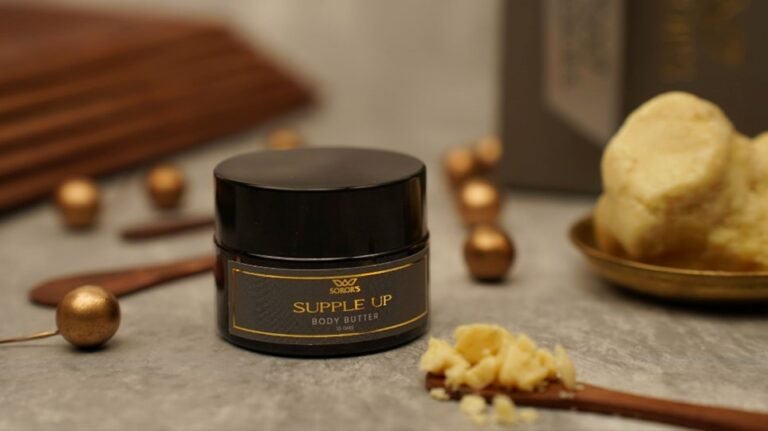The Ultimate Guide to Choosing Right Products for Dry Skin and Maintaining Hydration

1. Understanding Dry skin
1.1 What Causes Dry Skin?
Dry skin is a common condition that affect anyone at any time. Understanding what leads to dryness is the first step in combating it.
- Environmental Influences: Exposure to harsh weather, indoor heating, and low humidity can strip the skin of its natural moisture.
- Choices: Hot showers, excessive washing, and not hydrating enough can contribute to dry skin.
- Genetic Predisposition: Some people are simply more prone to dry skin due to their genetics. Conditions like eczema or psoriasis can also affect moisture levels.
1.2 The Importance of Hydration for Skin Health
Hydration is essential for skin function.
- Skin Barrier Protection: A well-hydrated skin barrier helps protect against irritants and bacteria.
- Elasticity and Appearance: Proper moisture levels contribute to skin elasticity, making it look plumper and healthier.
Healing: Hydrated skin heals faster, reducing the likelihood of cracks and infections.

2. Identifying Your Skin Type
2.1 Different Types of Dry Skin
Not all dry skin is the same, and recognizing the category you fall into can guide your product choice effectively.
- Normal Dry: A common type with slight flakiness but generally comfortable.
- Sensitive Dry: Often red or itchy, sensitive dry skin reacts easily to products and environmental factors.
- Very Dry: This type can feel tight and rough, with visible cracks or scaling.
2.2 How to Determine Your Skin Type
Identifying your specific skin needs is simple with a few easy tests.
- The Clean Face Test: Wash your face and leave it bare for an hour. If it feels tight, you have dry skin.
- Observe Size of Pores: Smaller pores may indicate dry skin, while larger pores could mean your skin is oily or combination.
2.3 The Relationship Between Skin Type and Product Selection
Understanding your skin type guides you in choosing the right products.
Sensitive Dry Skin: Opt for fragrance-free and gentle formulas.
- Very Dry Skin: Look for thick creams that provide more intense moisturization.
3.Selecting the Right Products
3.1 Ingredients to Look For
Certain ingredients can be incredibly beneficial for dry skin.
- Shea butter: It provides deep moisture, nourishes, and helps restore the skin barrier.
- Ceramides: Help restore the skin barrier, locking in hydration.
- Cocoa butter: Its rich, fatty composition penetrates deeply into the skin, providing intense hydration and forming a protective barrier that locks in moisture.
3.2 Ingredients to Avoid
Some ingredients can exacerbate dryness and should be avoided.
- Alcohols: Can be very drying, particularly in high concentrations.
- Fragrances: Often irritating and can lead to increased dryness, especially in sensitive skin.
- Sulfates: These can strip the skin of its natural oils, leaving it feeling parched.
3.3 Evaluating Product Formulations
Different product types target various moisture levels.
- Creams: Thicker formulations that provide deep hydration, ideal for nighttime use.
- Body butters:
Emulsified Body Butters: Butters in less percentage and few more ingredients
Non Emulsified Body Butters: Luxurious butter blends with rich texture without any water content. With highest percentage of natural butters making it a perfect rich and thick balm/cream that tackles with stretch marks, strawberry legs and marks making it a perfect product for night time after shower ritual. You can even include in weekly routine after your long everything shower.
Check out our 100% pure body butter
Pro tip : Always apply non emulsified pure butters on damp skin.4. Daily Skincare Routine for Dry Skin
4.1 Step-by-Step Morning Routine
Start your day with a routine that boosts hydration.
- Gentle Cleanser: Use a hydrating cleanser to avoid stripping moisture.
PRO Tip: If you are cleansing twice a day, try skipping cleansing in the morning and use just water. Follow it up with moisturizer and sunscreen. - Toner: Rose water is one of the best toner for dry skin as it hydrates, soothes, and balances the skin’s natural oils while providing anti-inflammatory and antioxidant properties.
3. Moisturizer: Follow up with a thick cream or lotion to seal in everything.
4. Sunscreen: Don’t forget this step for protection (look for moisturizing formulas).
4.2 Step-by-Step Evening Routine
End your day with a healing routine to restore moisture overnight.
- Cleansing Oil or Balm: To remove makeup and impurities without drying. Check out Kaolin melt cleansing balm from SOROR’s.
- Hydrating Toner: Helps prep the skin for nighttime hydration.
Check out Rose water from SORORS’s
- Night Cream or Sleeping Mask: Thicker formulas can work wonders while you sleep.
- Moisturize your body well: Use a thick moisturizer on damp skin
4.3 Seasonal Adjustments to Your Routine
Your skincare routine should evolve with the seasons.
- Winter: Include more hydrating treatments and heavier creams.
- Summer: Switch to lightweight serums and emulsions that won’t feel heavy in hot weather.
- Additional Tips for Maintaining Hydrated Skin
5.1 Lifestyle Changes to Support Skin Health
Hydration isn’t just about products—it’s also about your lifestyle.
- Drink Plenty of Water: Staying hydrated internally benefits your skin. Balanced Diet: Incorporate foods rich in omega-3 fatty acids, like chia seeds and fish, to support skin health.
- Avoid Alcohol-Based Makeup Removers: Cleansing oils or balms will be perfect as it cleanses without stripping out your natural oils.
- Set a Moderate AC Temperature: Keep your air conditioning at a comfortable level, ideally between 24°C to 26°C (75°F to 78°F), to maintain moisture levels.
- Avoid Irritants: Choose products without fragrances, alcohol, or other irritants. Soror’s skincare is specially curated for sensitive skin, free from synthetic fragrances and toxins
- Use a Humidifier: Especially in winter months to add moisture back into the air.
5.2 When to Seek Professional Help
Sometimes DIY solutions aren’t enough.
- Consult a Dermatologist: If your skin is persistently dry or you notice new symptoms, professional guidance can lead to better care options.
Conclusion
Taking care of dry skin involves understanding your skin type, choosing the right products, and maintaining a daily routine that prioritizes hydration. By being attentive to your skin’s needs, you can keep it healthy and glowing.
FAQs
What should I do if my dry skin worsens despite proper care?
If your dry skin continues to worsen, consider consulting a dermatologist who can provide tailored advice and treatment options.
Are natural products better for dry skin than synthetic ones?
It depends on your skin’s specific needs. Some natural products may be beneficial like pure butters or pure hydrosols. Always check labels and test products cautiously.
How often should I apply moisturizer to maintain skin hydration?
Applying moisturizer twice a day is recommended, but feel free to reapply as needed, especially after washing your hands or face. Listen to your skin’s cues!





